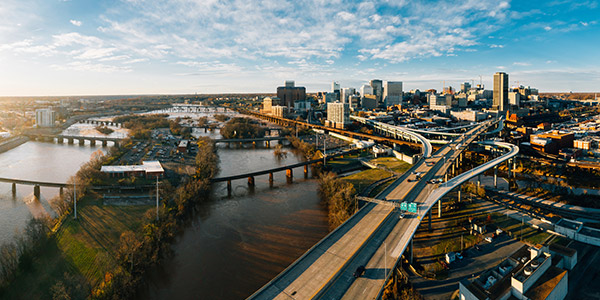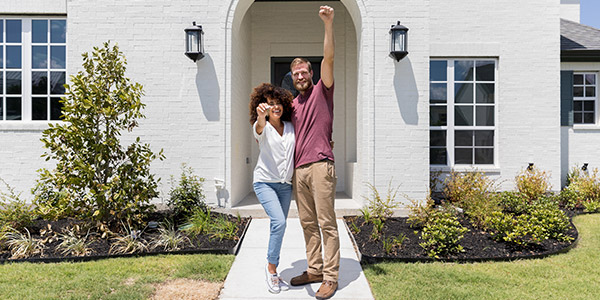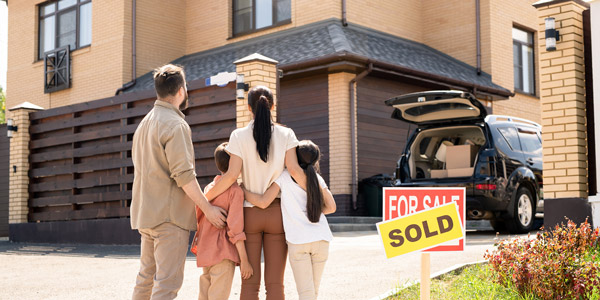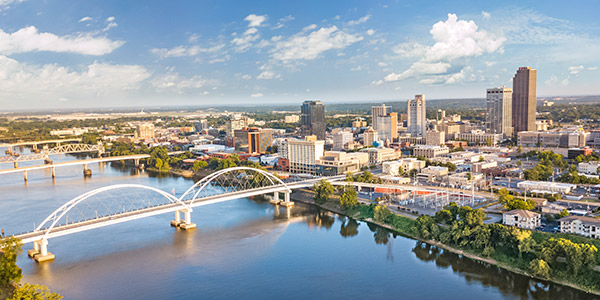Guides
Virginia First-Time Homebuyer Guide
September 29, 2023
Overflowing with history and natural beauty, Virginia has plenty to offer its residents. If you're thinking about buying a home in Old Dominion, don't be intimidated by the mortgage process; the state offers a series of first-time buyer programs and loan options to make buying easier. Read on to learn more about the many benefits that come with buying your first home in Virginia and how you can get started applying for loan pre-approval today with the team at New American Funding.
Benefits of Being a First-Time Homebuyer in Virginia
Virginia, like other states, offers a variety of benefits for first-time buyers, which may not be found in surrounding states. Some of the benefits that may be available to you include:
- Generous down payment assistance: Virginia's HOMEownership Down Payment and Closing Cost Assistance offers up to 15% down payment assistance, one of the highest in the country.
- Variable income limits for the Washington D.C. area: Most first-time homebuyer assistance programs have income limits related to the median state income. If you live in the D.C. area (where the cost of living is significantly higher than the remainder of Virginia), you may qualify for higher relative income limits. For example, Virginia Housing's programs offer D.C. loan limits more than double that in more rural areas.
- Historic significance: Virginia is rich in American history, with landmarks like Jamestown, Williamsburg, and Monticello. If you're interested in history and culture, living in Virginia provides easy access to these significant sites, and this historical significance may lead to higher property value accumulation in the future.
Qualifications for First-Time Homebuyers in Virginia
Government-backed mortgage loans and first-time buyers programs in Virginia were designed for people buying their first home. However, you could qualify as a first-time buyer if you have owned a home in the past. According to the HUD definition of a first-time buyer, you may qualify if you have not had an ownership interest in a property for at least three years.
Questions to Ask Before Buying Your First House in Virginia
Is now the right time to buy a home? Before delving into the process of getting a home loan, it's important to know that you are buying at the right time. Be sure to ask yourself the following questions before moving forward with loan preapproval.
1. What are Your Personal Long-Term Goals?
Before moving forward with planning a home purchase, it's important to think about how owning a home fits in with your long-term goals. For example, if you're established in your area and plan to live here for a longer period, buying a home might be a smart investment. If you're still paying off college debt and don't yet know where you want to settle down, a mortgage loan could be more of a burden than an asset.
2. What is Your Financial Situation?
You will also need to take an honest look at your finances before deciding if you should buy a home. Consider your current income and calculate what percentage of pre-tax income is consumed by other debt obligations. Be sure to also consider expenses like home maintenance and mortgage insurance when calculating how much you can afford.
Our mortgage calculator can help you get a better idea of the full cost of owning a home. Consider the full monthly expense of owning a home and compare your income to local pricing to determine if you can cover a monthly mortgage payment at this time.
3. What are Your Housing Needs?
Next, consider your ideal home location, and think about how your current and future housing needs may influence factors like ideal size. For example, while you might be living alone now, a mortgage can potentially be a 30-year commitment, and you could want to expand your family during this time, leading you to shop for a bigger home. It can be helpful to create a list of things you want in your home to guide your search.
4. What is the Real Estate Market Trend?
As you set out on your housing search, it's crucial to keep a close watch on the shifting landscape of real estate prices. By analyzing the trends in your local housing market, you can gain valuable insights into the fluctuations in property prices and use this info to your advantage. For instance, if you happen to notice a dip in home prices, that could indicate a favorable period to start exploring options with mortgage lenders.
5. What are Your Mortgage Options?
Finally, consider your savings and credit score to learn more about the types of home loans you may qualify for. Contrary to popular belief, you don't need 20% of a home's purchase price to buy it; the minimum down payment for most Conventional loans is 3%. If you have a lower credit score, government-backed loans like a Federal Housing Administration (FHA) loan can potentially help you purchase a home with a score of as little as 500 points. Review your details to determine which loan types might be right for you.
First-Time Homebuyer Statistics in Virginia
-
Average home price in Virginia: $372,943
- Minimum down payment in Virginia: 0% to 3.5%
How to Apply for First-Time Homebuyer Loan Programs in Virginia
Now that you understand the basics of owning a home, you might want to consider applying for a first-time homebuyer program to finance it. Here's how to get started applying for your first mortgage.
1. Determine Your Budget
Applying for a mortgage loan may affect your credit score, so it's important to be sure that you can afford a home before submitting your application. Use the mortgage calculator linked above and an online real estate database for the area where you're considering moving to determine if your income can support a home purchase. Be sure to include other expenses outside of your monthly mortgage payments, like homeowner's insurance and maintenance.
2. Get Pre-Approved for a First-Time Home Mortgage
If now seems like a solid time for you to get a mortgage from a financial perspective, the next step is to get pre-approved. Mortgage pre-approval is a tentative agreement from a mortgage lender to finance your home purchase up to a maximum dollar amount.
Now can also be a great time to begin applying for a first-time homebuyer program designed to help you cover your down payment. Some of Virginia's current state options include the following.
- Homeownership Down Payment and Closing Cost Assistance: This down payment and closing cost assistance program provides generous financial help for low-income buyers. Depending on your income and home location eligibility, you may qualify for up to 15% in down payment assistance plus an extra $2,000 or more towards closing costs.
- Virginia Housing Down Payment Assistance Grant: Virginia Housing offers variable down payment assistance grants for low- to medium-income residents throughout the state. This assistance is issued as a grant, which means that it never needs to be repaid as long as you meet the lender's conditions.
Additional down payment assistance may be available from your local government.
3. Hire a Real Estate Agent
Once you're pre-approved, you can begin searching for a real estate agent to help assist you in your home search. While an agent isn't legally required to help you buy a home, they can offer several benefits to your buying process, including:
- Helping draft your offer letter
- Assisting you in finding homes to tour
- Advising lenders or down payment assistance program options
- Communicating with the current homeowner of the property you want to buy to negotiate contingencies
NAF Homes,* an affiliate of NAF, can be an invaluable resource in connecting with local, qualified real estate professionals to help guide your home search.
4. Start the Search for Your Dream Home
After choosing an agent, have a sit-down meeting to discuss your wants and needs for your future property. If you have a list of features you're looking for, provide it to them and distinguish between must-haves and areas where you can be a bit more flexible. Your agent will be able to tell you if your wants and budget are realistic for your area and may suggest alternative areas or solutions to help keep you within your budget.
Your agent will review properties in the area for your review. If you see homes that you like, your agent will work together with the seller's agent to arrange a tour. You repeat this process until you find a home you want to buy.
5. Make an Offer
When you find a home that you want to purchase, you sit down with your agent to draft the official offer letter. The offer letter is a letter that you submit to a homeowner proposing that you buy the home, as well as details of the sale. Your agent will examine your local buying market to determine a competitive price to offer. If the seller accepts the offer, you're almost at the homeownership finish line.
6. Conduct Home Inspection
While a home inspection is not required by lenders in the same way that an appraisal is, you shouldn't skip this portion of the buying process. During a home inspection, a property condition expert will take a tour of the home you're in the process of buying to reveal any major damage or areas that will need to be repaired after you take over as the homeowner. If the inspection doesn't reveal any large problems you weren't already aware of, you can move toward closing.
7. Close the Deal and Become a Homeowner
The final step in the mortgage process is the closing of your home. During the closing meeting, you provide proof of transfer for your down payment and sign your mortgage loan. After the meeting, you will be the official new owner of the property. From here, your responsibility is to be sure that your mortgage payment is in each month and to enjoy your new home.
5 Traditional First-Time Homebuyer Programs in Virginia
Did you know that there are multiple types of mortgage loans? If you have a lower credit score or less money saved up in a down payment, paying attention to the multiple types of mortgage loans you have access to can help streamline your buying process. The following are five of the most common homebuyer programs you will see in Virginia.
Conventional Loan
While not reserved specifically for first-time buyers, Conventional loans are commonly used by first-time buyers for their flexibility and convenience. Conventional loans can be used to purchase any type of property and have lower interest rates when compared to government-backed mortgage loans. To qualify for a Conventional loan, you will usually need at least 3% down and a credit score of at least 620 points.
FHA Loan
FHA loans were developed to help lower-income individuals and those with less established credit to buy a home. To qualify for an FHA loan, you will need a credit score of at least 580 points and a 3.5% down payment with most lenders. Some lenders may allow you to get an FHA loan with a score as low as 500 points if you have at least 10% to put down.
VA Loan
VA loans are loans for members of the armed forces and Coast Guard, veterans, and family members of those who have served. Using a United States Department of Veterans Affairs (VA) loan, you may be able to buy a home with $0 down, and there are also options to roll your closing costs into the value of the loan. These loans also have more lenient credit requirements and do not have area-related restrictions like USDA loans. To qualify, you will need to seek documentation of your service from your local VA office.
USDA Loan
The USDA loan program was designed to promote homeownership in rural and suburban areas, and you could be able to buy a home with $0 down using one. To qualify, you will need to purchase a home within the boundaries of the United States Department of Agriculture (USDA), and you will also need to earn less than 115% of your local median income. Additional qualifications related to current debt and credit may also apply.
Closing Assistance Programs
In addition to the statewide resources detailed above, your local city may have down payment assistance programs or other resources you can use to ease the financial burden of buying a home. For example, residents moving to the city of Alexandria may access down payment assistance when purchasing a home through its Affordable Set-Aside Homebuyer Program, Neighborhood Stabilization Program, or Resale Restricted Homeownership Program. Learn more about your local government online and review program options.
What Are the Mortgage Rates in Virginia?
When comparing mortgage program options, considering interest rates is essential. The interest rate that you pay on your mortgage loan is a percentage of the sale price of the property minus what you paid in your down payment. This means that locking in an interest rate that's only a few percentage points lower than a competitor could end up saving you thousands of dollars by the time you pay off your home loan.
Purchasing Your First Property
While the process of buying a home might seem complicated to new shoppers, the truth is that getting a mortgage is now easier than ever before thanks to online underwriting. Before shopping, review your income and home needs as well as your local housing market to be sure that now is the right time to buy. You might want to consider using a government-backed mortgage loan for your first property purchase, which may allow you to buy a home with less strict qualifications.
Does now seem like the right time to buy for you? A NAF Loan Officer will be happy to answer any questions you may have, help you find the home loan that is right for your needs, and guide you through the application process.
Virginia First-Time Homebuyer FAQs
Is There an Income Limit for First-Time Homebuyers in Virginia?
No, there is no state income limit that restricts who can buy a home in Virginia. First-time buyer programs may have income limitations related to your home size and your local area, Review program documentation to learn more about income qualifications.
Can a Person With Low Income Buy a House in Virginia?
Yes, there are multiple programs that buyers with low income can use to purchase a property in Virginia. For example, the HOMEownership Down Payment and Closing Cost Assistance program can provide up to 15% of your home's purchase price to help with your down payment in addition to thousands more in closing cost assistance. Government-backed loans like FHA loans were also designed for those with lower incomes to buy a home with looser qualification criteria.
Most buyers will need to put down at least 3% to buy a home in Virginia, as this is the minimum set in place for Conventional loan purchases. If you qualify for a VA or USDA loan, you could be able to buy a home with $0 down.
Does Virginia Have First-Time Buyers Programs?
Yes, Virginia offers generous programs for first-time buyers. State-wide programs for first-time buyers in Virginia include the Virginia Housing Down Payment Assistance Grant and the HOMEownership Down Payment Assistance program. Individual cities also offer their own programs.
Do You Have to Pay Back Down Payment Assistance in Virginia?
You may not need to pay back your down payment assistance as a resident of Virginia depending on whether the program is offered as a loan or a grant. Grants typically do not need to be repaid, while loans require repayment unless they are forgivable.
* NAF Homes, Inc. is an affiliate of New American Funding and does not originate mortgage loans or issue loan commitments. NAF Homes, Inc. is a MI Real Estate Broker #6505431109, Tel. 844-626-1300.
NMLS #6606. www.nmlsconsumeraccess.org. Terms and Conditions Apply. This is not a loan commitment or guarantee of any kind. Loan approval and rate depend on borrower credit, collateral, financial history, and program availability at origination. Rates and terms are subject to change without notice. All mortgage loan products are subject to credit and property approval. © New American Funding, LLC. New American and New American Funding are registered trademarks of New American Funding, LLC. All Rights Reserved. Corp Office 14511 Myford Rd, Ste 100, Tustin, CA 92780. Ph 800-450-2010.




